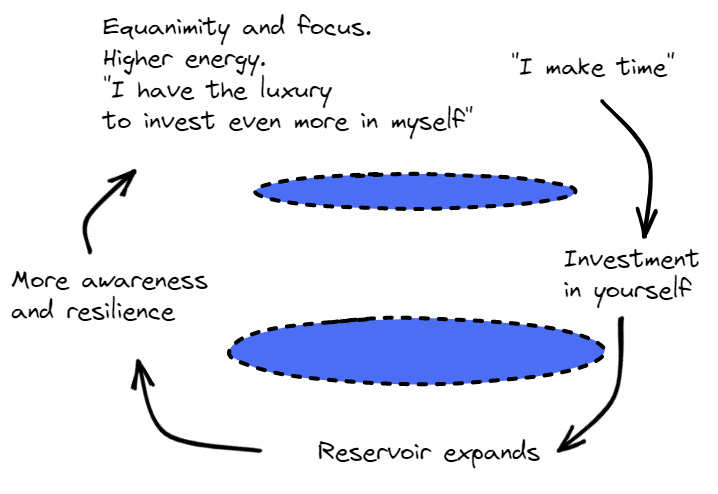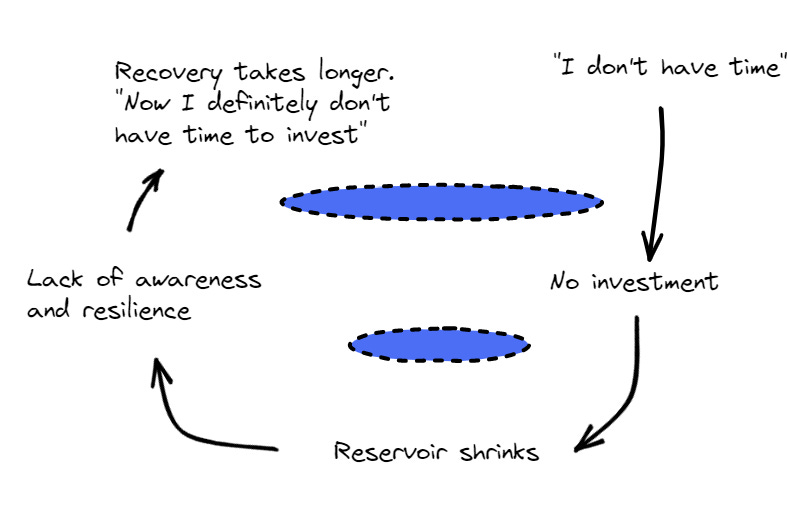
A few days ago, I was scribbling like a madman. I had to spill my mind out on the page, by hand, to get to the bottom of my thoughts. Or at least to get one level deeper than the state of heaviness and confusion in which I’d woken up. I ended up with ten hand-written morning pages before I finally disentangled my mind. This was one of several practices that brought me back to a baseline state of equanimity and focus that day.
Since 2018, I have been keeping a daily spreadsheet tracking things like mood, sleep, what I do, who I meet. It’s not perfect (honestly, it’s often a mess) and it’s not always consistent. But like journaling, the spreadsheet allows me to reflect. And unlike journaling, it doesn’t take much time for patterns to emerge.
Reflection
The spreadsheet helped me identify indicators, either signals of my body or patterns in my behavior. George Soros used to get back pain when his subconscious pattern recognition signaled a need to change the portfolio. For me, indicators include repeated trouble falling asleep (unrelated to days without proper sleep hygiene, like drinking caffeine late), mood swings and emotional volatility (when I catch myself raising my voice over something trivial, for example), a resistance to engage with the day, a lack of enthusiasm or flow for creative work, and social isolation.
All of these can be signals that I’m off balance or that there is something going on that I need to work out. I take this awareness for granted now, but I used to be completely ignorant of any of it.
Resilience
Understanding your indicators is important because it allows you to intervene quickly. My mood can still swing rapidly but it used to be extreme. I rate it on a scale from 1-10 and I found weeks when it oscillated between 9 and 2, depending on what happened, who I met, who said what.
Sure, I put on a brave face, went to work, did what had to be done. But I did not investigate what was going on and I lacked tools to engage with it. This lack of awareness led to a lack of action. And a lack of action meant that I let myself get carried along by thoughts and emotions. I was riding on autopilot.
A lack of tools means it takes much longer to recover from the blows of life. I was not good at bouncing back from setbacks (like getting fired or dealing with a broken heart). I used to carry the tension and push forward. I tried to solve turmoil through thinking, work, or denial. I tried making more plans, grinding harder at work, sleeping more, escaping into video games, books, movies, or by denying there was any issue altogether. Needless to say, when stressed, I was not a pleasant person to be around. In retrospect, I think I indulged in my moods. I just accepted them as ‘who I was’. Finding my way back to writing and therapy were the first rungs of my ladder back to life.
Today, I have a number of practices that make up my ‘Reservoir’ — the place where I can exchange time for energy when my cup is empty.
The Reservoir
Why is this important? Negative spaces are a part of life. Feelings of depression, anxiety, anger, envy, resentment, and so forth are part of the human experience. The question is what you do next. When you feel depleted, it’s easy to start wasting precious time. How long does it take until you visit your Reservoir?
A day that starts with a setback can easily turn into a lost day. Thoughts spiral. Inner criticism gets louder. The pressure mounts. A bad day spills into the next. The world starts feeling like a place hostile to your goals and dreams.
The practices and people that make up your Reservoir can help arrest the immediate negative spiral and at least get back to a baseline from which you can take further action.
You may need more help, including professional help, to figure out the root cause of an issue and sort out the appropriate response. But first you find your way into a state that allows you to do that. When your energy is depleted, that can seem like a serious challenge. In our worst moments, it can even feel like we don’t want to get better. We indulge in the negativity. I used to do that. I felt sorry for myself. I moped. It sounds trite, but what I needed most were basic practices, like exercise, meditation, and a place of community. And I needed for them to be habits, deeply ingrained into my schedule. The amount of energy required to visit the Reservoir has to be minimal.
I view this as a self-reinforcing cycle. If you invest time in yourself, that is in expanding and deepening your Reservoir, you increase your awareness and resilience. You bounce back more quickly from setbacks. The quality of your remaining time increases.
If, on the other hand, you start with a scarcity mindset of ‘I have no time to invest in myself’, your Reservoir will start shrinking. Wrestling with the world will deplete your energy. Recovery will be lengthy and time will be wasted in states of low energy. You end up even more stressed, more pressed for time, and at risk of further cutting back your investment in yourself.
That’s what I let happen out of ignorance, convenience, laziness, resistance, and lack of good habits. Don’t make that mistake. Invest the time and energy to expand your reservoir before you need to tap into it.
Questions for reflection:
Do you pay attention to your body’s signals?
Do you have a practice of observing your own behavior and spot patterns?
Do you notice emotional volatility and changes in how you act?
Do you keep track of when you get off track? And do you know what to do next?
Do you know what makes up your Reservoir? Do you know your path to restore energy and equanimity?
Things that work for me.
Some of the following practices I try to do daily, others weekly, monthly, or whenever I feel the call (or overcome my resistance). Perhaps you find new ideas among them.
I don’t think there is a blueprint for the perfect Reservoir. Rather, I think of it as a personal space that reflects your uniqueness. I imagine it looks completely different for others: if, for example, you are extroverted, have your own family, or own a house. Perhaps your reservoir includes team sports, time with your spouse and children, hosting dinner for friends, time spent cooking or making music or gardening.
That said, I believe a full Reservoir includes practices that address the dichotomies of life: mind and body, inner and outer, tension and relief, activity and rest, loud and quiet, nature and culture, masculine and feminine, input and output.
I would love to hear from you in the comments: what are key elements of your reservoir? What practices have you recently taken up? What has been more effective than you could have imagined? This is your space to share.
Thank you for reading and sharing. Thank you for showing up.
Frederik
Some things that work for me:
Working out. I try to do at least a short workout every day, ideally in the morning. I currently do either weights, cardio (stairmaster), or yoga.
Meditation. About a month ago, I stepped up my meditation practice to twice daily, ideally 20 minutes. I’ve started and dropped meditation in the past, especially when my routines were disrupted by travel or other events. Having said that, meditation has been a game changer for me.
Walks and nature (tough in Manhattan, I compromise with parks). Ideally often without podcasts, music, or audiobooks. Sometimes it’s great to have their intellectual stimulation and input. But often I find that they distract me from the ideas and clarity that can otherwise emerge. I always bring my phone and frequently record ideas on Otter.ai and later revisit the transcript.
Breathwork. I’ve experimented with a few different techniques and this has been unexpectedly powerful. I don’t currently do it consistently. It’s a habit to work on. I’ve found the Wim Hof breath fairly accessible. Holotropic breath is a wild experience (be sure to do it with an experienced practitioner). Box breathing, double inhales, and 4-7-8 breath all help me in moments of anxiety or when trying to relax. I sometimes use them at the beginning of meditation.
Journaling and morning pages. I journal almost every day and I started morning pages again to get into creative flow.
Power naps and yoga nidra. For me a ten minute nap or a 15 minute guided yoga nidra session (like this one) can be powerful refreshers. That said, I currently often opt for a short walk instead.
Socializing. A big bucket and one that I painfully neglected for a long time. Someone called nature the ‘greatest healer’ but the same can be said for family, friends, and community. Community has been one of the biggest factors changing my life over the past year or so and it’s worth its own future post. I’ve also recently started attending a men’s group and see a lot of potential in the work with small groups.
Sound meditation. A little more esoteric but it has been one of the great forces of healing and transformation in my life.
Also: therapy, music, vocalization/singing/humming, dance, The Tools (short visualization practices that alter the emotional state), cold showers (no ice baths for me, at least not yet), massage, sauna, and hot baths.






If you want to 10x your breathwork, consider Othership. It's pricey, but it has unlocked significant spiritual and emotional awaking during the 20-45 minute journeys. It has also helped me reduce my awake breath per minutes from 18 to 12 over a three month time period, and my cardiovascular health as improved considerably.
The only guarantees in life are work, pain, and discomfort. If you start with this framework and understanding, everything else in your control should act as tools to help you overcome it. Live a life by design by starting with the person you want to be in light of these guarantees.
Grateful for this piece.
I resonate with the practices and tools that you have gravitated to.
I have found that intense physical activity, incorporated into every day is crucial, to bring a sense of personal power, strength, and confidence. Jiu Jitsu has been an incredible art and discipline to be a part of, just in learning intense embodied movement and grappling, and really, to explore the edges of our comforts.
Going into the remote mountains when possible is tremendously healing and humbling. There's something about the quietness of the natural world, while simultaneously being reminded of how small we are, while we are still a miracle for simply existing. I think it's the experiences that provoke dreams and imagination such as looking up at the stars, across the ocean, or the high peaks. To see the magic of the earth and beyond.
Lastly, taking moments to focus on the breath. To move slowly and breathe deeply, really taking in the fresh air. Breathing can be so calming while also so empowering and powerful. Something so simple yet profound.
Making these changes, and putting our attention on the right things, the things that add to our lives
and fill us with energy is crucially important.
Thanks again for this great piece.